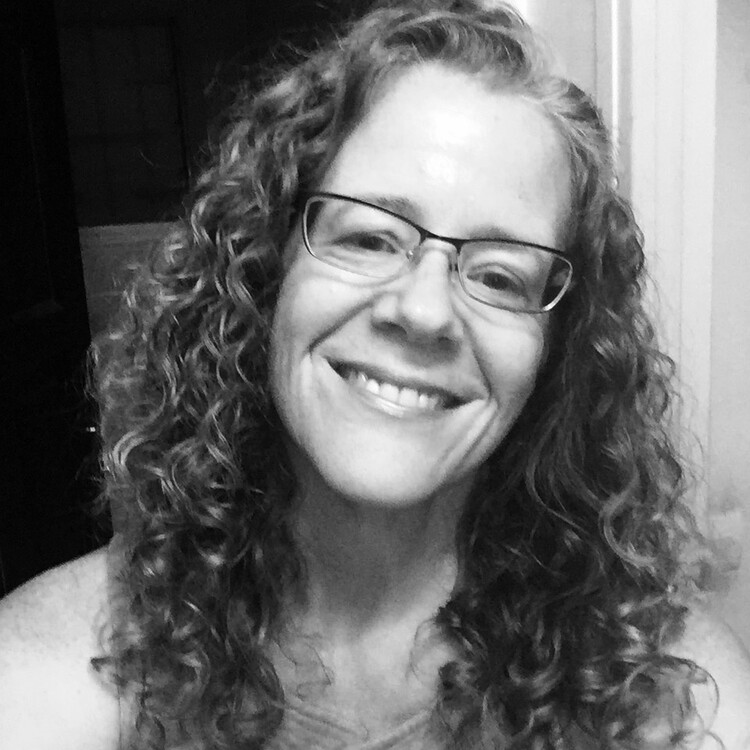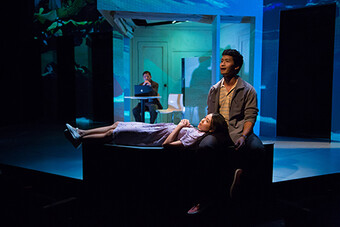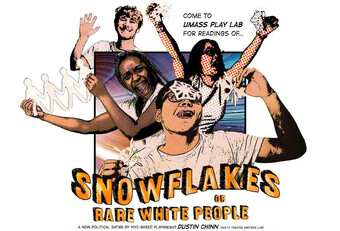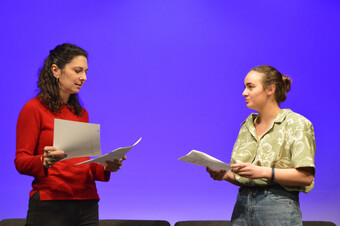The Obligation to Question
Seminar at Florida State University School of Theatre
They arrive in jeans and t-shirts, shorts, and flip-flops. Azure-haired, gray-haired, they sit and talk, laugh, study, pace, warm-up, braid each other's hair, text, and take pictures. They are young and old, professional and amateur, the cast and crew of Florida State University's (FSU) production of Seminar by Theresa Rebeck. FSU has long housed a top-ten School of Theatre (SOT) and a top-five BFA acting program. According to Playbill's Broadway Big 10 list, a higher percentage of those in training here will go on to careers in professional theatre—off and on Broadway—than from almost anywhere else, especially from public universities. Florida, like much of the country, now values entrepreneurship and job acquisition more than other goals of university education, so employed BFAs feed the budget gods the manna they need. But lives happen inside and outside and all around jobs in every profession. Theatre careers are maintained because actors and directors and stage managers can do more than present the best audition or portfolio. What is it that makes lives undergirded by a theatre education thrive?
As Trevor Durham suggested in his Broadway World review, Seminar is an “unorthodox” choice for opening a university season. It is deceptively simple for both the cast and the audience—nine scenes, five characters, two sets. Yet it is built on nuance which means its participants—actors, crew, even audience—are at high risk of getting lost in the weeds. In ninety minutes, Seminar shows changes in the world view and personal identity of each of its five characters. There is no romance, good does not overcome evil, and the plot can be encapsulated thus: writers Douglass, Izzy, Kate, and Martin meet writing teacher Leonard. To communicate the nuance, its small ensemble cast of five must create intimacy with a small-city-university audience used to big shows they have seen before. (That FSU SOT sold out all fifteen performances of its 2014 production, Spamalot, weeks before opening night is a case in point.) Seminar is merciless in its demand for presence and requires a level of selflessness almost but not quite impossible to achieve. For all of these reasons, it may be the ultimate teaching tool.
‘Seminar’ is merciless in its demand for presence and requires a level of selflessness almost but not quite impossible to achieve. For all of these reasons, it may be the ultimate teaching tool.
My relationship to seeing this show and the process behind it has not been typical. As a university teacher and cultural scholar, I am more interested in the role of theatre in the public sphere than I am in the particular artistic successes or failures of this production. Rebeck’s Seminar, a long conversation, really, among people not clearly villain or hero, addresses in problematic and often unsatisfying ways the ethics of the theatre and its teachers—who gets to write plays, publish them, produce them? How much does commerce drive artistic production? Is all mentorship about finding the one most like the mentor’s dream of self to promote? These subjects will be wrestled with in artistic ways as the director, actors, designers, and crew engage Rebeck’s text and create their production. These subjects will also be worked out in the human interactions demanded by theatre and that is why I come to watch rehearsals. I first observed the third rehearsal and then watched at least three rehearsals every week thereafter. I met with the actors, the director, the student director, the stage manager (a student), and the assistant stage manager (also a student) to discuss the show. At every turn I saw and heard students gaining new skills, polishing craft, aware of and investigating the big picture of the play and the role of theatre in the public sphere.
Just like there is discipline in the drills at the barre or drills on the field, there is discipline provided to these actors in rehearsal through the choreography of their bodies and the business of their hands. Director Cameron Jackson began by teaching blocking. We may as humans have movement that reflects our words and thinking, but here the process seems to work backwards. Once a body knows where to go and a hand knows what to do, the mind and spirit can investigate the complexities alive within that movement.
Jackson enhances the actors’ use of movement as a path to deeper learning by guiding each rehearsal with questions. Focusing actors on pacing and movement and positioning initially provides them an anchor during the inquiry:
What do you need from us to make that scene less like a race?
What kind of discoveries do we have when it is Douglass's time to leave?
When Martin sits on the divan with Kate, what's going through his head?
This group of student actors, Jackson has told me, are particularly generous: “They want to partner in creating the art... They have a generosity with each other that is a demonstrable marking that this is bigger than any of us... a maturity that will take them as far as they want to go.” To be “forever rooted in the inquiry” marks Cameron’s teaching, these students’ learning, and each rehearsal and performance.
Though styles vary, Cameron Jackson's direction of Seminar created an environment of healthy sacrifice for the common good. Ward Duffy, the Equity actor hired for the role of Leonard (the writing teacher), modeled the highest professionalism, working and learning along with everyone else. During rehearsals I observed actors and director map the relationship between performance and vision, deciding again and again why some details served this vision and others did not. I saw everyone listen, read, question, risk, fail, learn, and try again. I heard characters and practitioners struggle to separate the worth of the self from the quality of the work. I watched everyone prepare so that no one’s work would get in the way of an audience member’s experience of the play.
Antonina Vargas, the actress who played Kate, told me that there is a “never ending learning process in theatre;” that “the work is happening even in performance.” This was evident in each of the three ticketed performances I saw, particularly in the exchanges between Leonard and Martin, and between Martin and Kate, where each performance drew out different threads of relationship, vulnerability, and need. One performance drew audible gasps at the discovery of Kate and Leonard’s sexual relationship. Another performance brought raucous laughter at Kate’s standing up to Martin. FSU's actors, stage managers, prop masters, and Tammy Honesty's amazing set design all did what their director asked: they got out of the way of the words and the result was that Rebeck's words sunk in deep and haunted for days. My post-performance conversations with audience members were riddled with questions of female identity and autonomy as well as musings about Leonard’s teaching. No one, it seemed, could resist applying the play to their own life experiences. For everyone it was “relevant.”
‘Seminar’ reminded its audience and cast of the power of nuance, not an easily attainable get in our current climate of shock jocks and political hate speech.
Cecil Jennings, who played Martin, was drawn to the show because he likes shows “that really do sound human.” He, too, echoed Vargas’ understanding that learning never ends in theatre; in each rehearsal, each production Jennings says he learns more about his own process, more about how he works. With this production in particular, Ward Duffy's willingness, even courage, to ask questions and wrestle out loud with what he did not yet understand allowed Jennings to ask more questions, to seek out the director to explore what he couldn't yet see.
Perhaps these are elements that every theatre training program should offer. I was impressed with how these students will go on to do more in theatre than perform and create because they will leave school with a mature understanding of how their craft works and why their art matters.
Skye Kim sees playing Izzy as an opportunity to interrogate how one can be aware of and use stereotypes applied to them and still be “independent and liberated,” from what others see and expect. Daniel Deist was struck by the dynamic nature of the characters, surprised even that Douglass and Kate can in just a few scenes grow to be friends, aware that theatre provides a mirror to its audience and that the “interiority and exteriority” of Kate and Douglass would let someone see himself. “Theatre is always relevant,” claims Deist. Hannah Katz, the Assistant Director, was already a fan of Theresa Rebeck's works. “My favorite plays are where there are four people, five people in a room and there is less of a spectacle so you get to talk about what matters more. Because people are like that.”
FSU SOT's production of Seminar confirms that theatre is the people's art. Actors, crew members, designers, directors, and audience members alike welcomed the performances into their daily lives by asking questions of the script, of the artist’s interpretations, and of how to apply what they experienced. And for that reason alone, theatre education seems a powerful tool for undergirding thoughtful lives of consequence. We need theatre and people educated in making theatre more than ever before because they can ask questions—old and new—about this historical moment. In this culture we put things down in words to solidify them, to make a singular meaning clear. FSU SOT's Seminar instead created a world with words that offered no singular focus or moral. As much as humanly possible, this performance honored Rebeck’s text by turning a light equally on each character, every relationship, and all the possibilities therein. It seems fitting that university theatre in particular puts ideas into the air and demands we try them on for size, taste them, and decide how we want to interact with them. Seminar reminded its audience and cast of the power of nuance, not an easily attainable get in our current climate of shock jocks and political hate speech. To be allowed for weeks (the actors and crew), or hours (the audience), to meet the obligation of considering a myriad of possibilities instead of arguing for one “right” idea about friendship, love, teaching, learning, defining ourselves, and allowing others to define us, and to be obligated to do so as an audience, in community, was the deepest experience of social equality I have had in years. What better learning is there?








Comments
The article is just the start of the conversation—we want to know what you think about this subject, too! HowlRound is a space for knowledge-sharing, and we welcome spirited, thoughtful, and on-topic dialogue. Find our full comments policy here